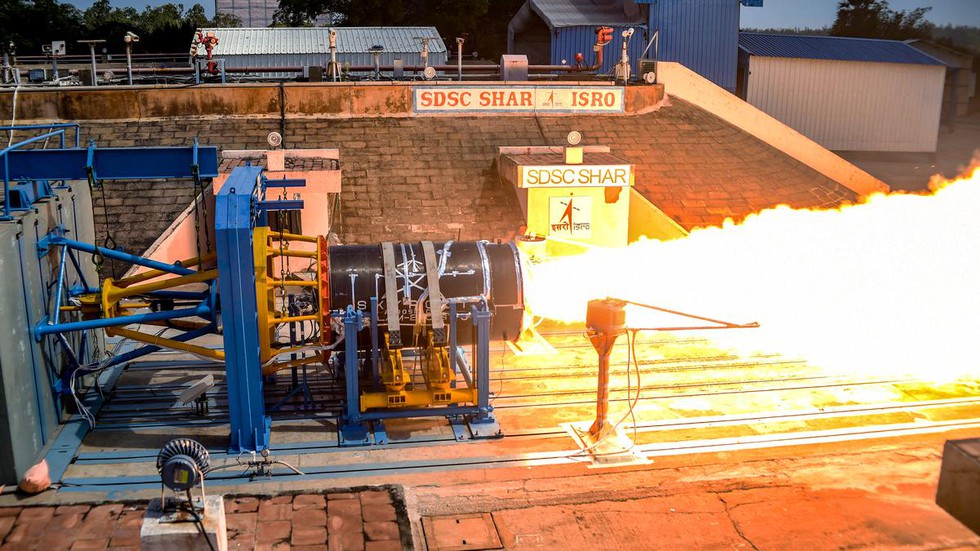Skyroot Aerospace, a prominent space-tech company, recently achieved a significant milestone by successfully test-firing Stage-2 of the Vikram-1 space launch vehicle, named Kalam-250. This test took place at the Indian Space Research Organisation (ISRO)’s propulsion testbed located in the Satish Dhawan Space Centre (SDSC) in Sriharikota, Andhra Pradesh.
Importance of Stage-2
Stage-2 plays a crucial role in the launch vehicle’s ascent as it propels it from the atmospheric phase to the deep vacuum of outer space.
Significance of Vikram-1 Launch
The Vikram-1 launch is a historic event for the Indian space sector as it marks the first private orbital rocket launch in India. This achievement follows the suborbital space launch of India’s initial private rocket, the Vikram-S, by Skyroot in November 2022.
Test Details
- The test duration lasted 85 seconds.
- Peak sea-level thrust recorded was 186 kilonewtons (kN), estimated to translate to around 235kN fully expanded vacuum thrust in flight.
- Kalam-250 utilizes a high-strength carbon composite rocket motor and a high-performance Ethylene-Propylene-Diene terpolymers (EPDM) Thermal Protection System (TPS).
- Stage-2 incorporates a carbon ablative flex nozzle and high-precision electro-mechanical actuators for thrust vector control to achieve the desired trajectory.
Collaborative Efforts
The Vikram Sarabhai Space Centre (VSSC), another center of ISRO, contributed to the test by supplying its proprietary head-mounted safe arm (HMSA) for the safe operation of the rocket stage.
Manufacturing Details
- Solid propellant for Kalam-250 was processed by Solar Industries at their Nagpur facility.
- Prior to this test, Skyroot successfully tested Kalam-100, the third stage of Vikram-1, in June 2021.
Statements from Leadership
- CEO and co-founder Pawan Chandana highlighted the significance of the milestone achieved, emphasizing the successful test of the largest propulsion system designed and manufactured by the Indian private sector.
- COO and co-founder Naga Bharath Daka discussed the validation of the flex nozzle control system as a critical achievement in the company’s journey towards the maiden orbital launch of Vikram-1 in 2024.
Multiple Choice Questions (MCQs):
- Where was the Stage-2 of the Vikram-1 space launch vehicle test-fired?
- A) Kennedy Space Center
- B) Satish Dhawan Space Centre
- C) Baikonur Cosmodrome
- D) Jiuquan Satellite Launch Center
- Answer: B) Satish Dhawan Space Centre
- What is the significance of Stage-2 in a space launch vehicle?
- A) It houses the crew module
- B) It propels the launch vehicle from the atmospheric phase to outer space
- C) It contains the payload
- D) It controls the descent phase
- Answer: B) It propels the launch vehicle from the atmospheric phase to outer space
- Which material is used in the construction of the Kalam-250 rocket motor?
- A) Aluminum alloy
- B) Stainless steel
- C) High-strength carbon composite
- D) Titanium
- Answer: C) High-strength carbon composite
- What contribution did the Vikram Sarabhai Space Centre (VSSC) make to the test?
- A) Providing test facilities
- B) Supplying rocket components
- C) Designing the launch trajectory
- D) Supplying a safety arm for the rocket stage
- Answer: D) Supplying a safety arm for the rocket stage
- Who remarked on the importance of the flex nozzle control system validation during the test?
- A) Pawan Chandana
- B) Naga Bharath Daka
- C) CEO of ISRO
- D) Prime Minister of India
- Answer: B) Naga Bharath Daka
